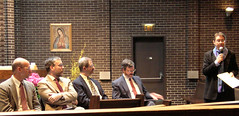It’s been a long, busy week. I finally finished up my Winslow Lecture, and delivered it to a very full house on Thursday. It went well — a number of people gave very kind feedback about it — and I’ll post a summary in the “Extended” window below (it’s probably too long to post the whole thing, but I’ve uploaded a pdf of the complete text of my lecture, with notes).
Trevor came out from Ohio to stay with us during the series, which was terrific; we don’t get to see enough of him, now that he’s far away. We got to see a little of Steve, less than we’d have liked, but it was complicated since Francis and Kevin were here on equal standing as lecturers, though not such long-term friends. It was excellent getting to talk at greater length with Kevin and Francis, and at lunch yesterday Kevin allowed that my more loosely-joined hermeneutics (more loose than his) make more sense to him when he sees the shape of community life here.
At dinner Thursday night, at Koi in Evanston (home of the “Mongolian Plates,” which the menu describes: “The major staple of this dish is its wok-seared characteristic”), we learned that not only did Francis not know about blogging and tofu, but he didn’t know what a dumpster was, either. Steve helpfully equated “dumpster” with a British “skip,” so that was easily solved. “And another thing word I didn’t recognize,” Francis added, “was — ‘mojo’?” That was a little harder for us to explain, especially with a degree of circumspection concomitant with Francis’s dignity and decorum. I suggested that he might have heard of Muddy Waters, and he, at the other end of the table, said, “Oh, it means ‘to muddy the waters’?” At that point, we were nearly helpless at the incongruity of the situation.
I’m very relieved to have finished this up, and a little embarrassed at how much less-well-developed my thoughts were in South Bend last week, compared to the way I ordered them in my formal lecture this week.
Continue reading “Catching Up”
